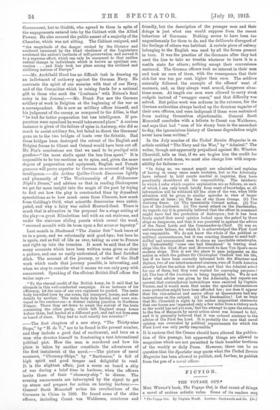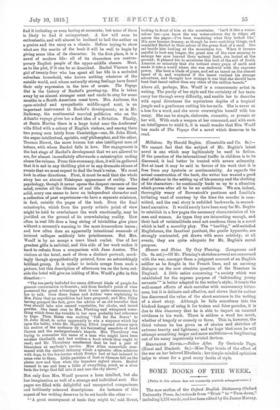FICTION.
THE VOYAGE OUT."
Mae. WooLr's book, The Voyage Out, is that rarest of things. a novel of serious artistic value. Some of its readers may Did )'oyapo Oat. By Virginia Woolf, London: Duckworth and Co. [Gs.]
find it irritating or even boring at moments; but none of them is likely to find it unimportant. A few will even be enthusiastic, and will almost be inclined to hail the author as a genius and the story as a classic. Before trying to show what are the merits of the book it will be well to begin by giving some idea of its character. In the first place, it is a novel of modern life : all of its characters are contem- porary English people of the upper-middle classes. Next, as to the plot, if it can be so described. Rachel Vinrace is a girl of twenty-four who has spent all her life in a secluded suburban household, who knows nothing whatever of the outside world, and whose naturally strong feelings have found
their only expression in the love of music. The Voyage Out is the history of Rachel's growing-up. She is taken away by an almost stranger aunt and uncle to stay for some months in a South American coast town. Mrs. Ambrose, the open-minded and sympathetic middle-aged aunt, is an
important instrument in Rachel's development; so is Mr. Dalloway, the sentimental married politician who on the
Atlantic voyage gives her a first idea of a flirtation. Finally, at Santa Marina there is a large hotel near the Ambroses' villa filled with a colony of English visitors, and among them two young men lately from Cambridge—one, St. John Hirst, the super-intellectual, egoistic, naif philosopher, and the other, Terence Hewet, the more human but also intelligent man of letters, with whom Rachel falls in love. Her engagement is the last stage of Rachel's development that we are allowed to see, for almost immediately afterwards a catastrophic ending closes the volume. From this summary, then, itwill be gathered. that it is not in any thrilling plot or in any dramatic climax of events that we must expect to find the book's value. We must look in other directions. First, it must be said that the whole story has an almost Tolstoyan appearance of reality. The psychology, though it never opens the deepest recesses of the mind, creates all the illusion of real life. Every one seems solid, every one seems to have an independent character and
a collection of past experiences—to have a separate existence, in fact, outside the pages of the book. Even the final catastrophe, which from the purely artistic point of view might be held to overbalance the work emotionally, may be justified on the ground of its overwhelming reality. How often in real life does a long string of trivialities give place without a moment's warning to the most tremendous issues ;
and how often does an apparently intentional crescendo of interest collapse suddenly into pointlessness. But Mrs.
Woolf is by no means a mere bleak realist. One of her greatest gifts is satirical, and this side of her work makes it hard to refrain from a comparison with Jane Austen. The visitors at the hotel, each of them a distinct portrait, mock- ingly though sympathetically painted, form an astonishingly brilliant group. It is unfair to isolate scraps from such a picture, but this description of afternoon tea on the lawn out-
side the hotel will give an inkling of Mrs. Woolf's gifts in this direction :— " The tea-party included too many different kinds of people for general conversation to flourish; and from Rachel's point of view possessed the groat advantage that it was quite unnecessary for her to talk. Over there Susan and Arthur were explaining to Mrs. Paley that an expedition had been proposed; and Mrs. Paley having grasped the fact, gave the advice of an old traveller that they should take nice canned vegetables, fur cloaks, and insect powder. She leant over to Mrs. Flushing and whispered some- thing which from the twinkle in her eyes probably had reference to bugs. Then Helen was reciting Toll for the Bravo' to St. John first, in order apparently to win a sixpence which lay upon the table; while Mr. Hughling Elliot imposed silence upon his section of the audience by his fascinating anecdote of Lord Curzon and the undergraduate's bicycle. Mrs. Thornbury was trying to remember the name of a man who might have been another Garibaldi, and had written a book which they ought to read; and Mr. Thornbury recollected that he had a pair of binoculars at anybody's service. Miss Allan meanwhile mur- mured with the curious intimacy which a spinster often achieves with dogs, to the fox-terrier which Evelyn had at last induced to come over to them. Little particles of dust or blossom fell on the plates now and then when the branches sighed above. Rachel seemed to see and hear a little of everything, much as a river feels the twigs that fall into it and sees the sky above."
Not only does Mrs. Woolf possess a keen intellect, but she has imagination as well of a strange and individual sort. Her pages are filled with delightful and unexpected comparisons and brilliantly coloured descriptions. An instance of this aspect of her writing deserves to be set beside the other " 'A groat encampment of tents they might be,' said }Iowa,
looking in front of him at the mountains. 'Isn't it like a water- colour too—you know the way water-colours dry in ridges all across the paper—I've been wondering what they looked like.' His eyes became dreamy, as though he were matching things, and reminded Rachel in their colour of the green flesh of a snail. She sat beside him looking at the mountains too. When it became painful to look any longer, the great size of the view seeming to enlarge her eyes beyond their natural limit, she looked at the ground; it pleased her to scrutinise this inch of the soil of South America so minutely that she noticed every grain of earth and made it into a world where she was endowed with the supreme power. She bent a blade of grass, and set an insect on the utmost tassel of it, and wondered if the insect realised his strange adventure, and thought how strange it was that she should have bent that tassel rather than any other of the million tassels."
Above all, perhaps, Mrs. Woolf is a consummate artist in writing. The purity of her style and the certainty of her taste carry her through every difficulty, and enable her to describe
with equal directness the mysterious depths of a tropical jungle and a gentleman cutting his toe-nails. She is never at a loss for a word, and she never overweights herself with too many. She can be simple, elaborate, romantic, or prosaic at her will. With such a weapon at her command, and with such an intelligence to wield it, it is small wonder that Mrs. Woolf
has made of The Voyage Out a novel which deserves to be read.



































 Previous page
Previous page